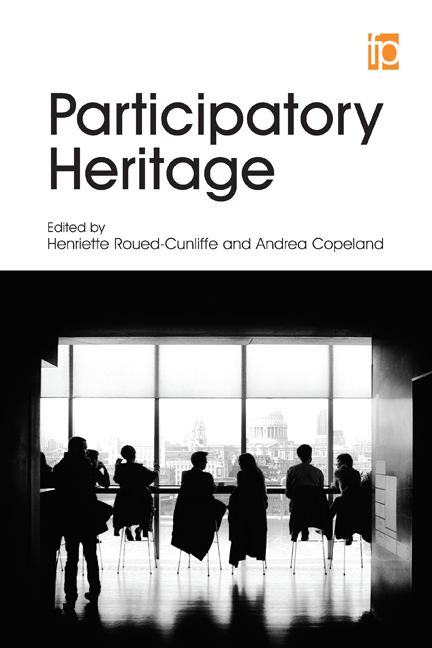Book contents
- Frontmatter
- Contents
- List of figures and tables
- Contributors
- Introduction: what is participatory heritage?
- Part 1 Participants
- 1 A communal rock: sustaining a community archives in Flat Rock, Georgia
- 2 The Bethel AME Church Archive: partners and participants
- 3 Creating an authentic learning environment for school children: a case study of digital storytelling programmes at the Mudgeeraba Light Horse Museum
- 4 Viking re-enactment
- 5 Learning, loving and living at the Australian Country Music Hall of Fame
- 6 The contributions of family and local historians to British history online
- 7 Forgotten history on Wikipedia
- Part 2 Challenges
- Part 3 Solutions
- Further reading
- Index
1 - A communal rock: sustaining a community archives in Flat Rock, Georgia
from Part 1 - Participants
Published online by Cambridge University Press: 08 June 2018
- Frontmatter
- Contents
- List of figures and tables
- Contributors
- Introduction: what is participatory heritage?
- Part 1 Participants
- 1 A communal rock: sustaining a community archives in Flat Rock, Georgia
- 2 The Bethel AME Church Archive: partners and participants
- 3 Creating an authentic learning environment for school children: a case study of digital storytelling programmes at the Mudgeeraba Light Horse Museum
- 4 Viking re-enactment
- 5 Learning, loving and living at the Australian Country Music Hall of Fame
- 6 The contributions of family and local historians to British history online
- 7 Forgotten history on Wikipedia
- Part 2 Challenges
- Part 3 Solutions
- Further reading
- Index
Summary
IN A SMALL American community, south-east of Atlanta, in the state of Georgia, African-American heritage is like a rock – solid, strong, steadfast and, for many years, silent. Flat Rock gets its name from the flat rock outcrops that are ubiquitous throughout the region due to the two nearby granite structures known as Panola Mountain and Arabia Mountain (McVey, 1966). Beyond its geographical uniqueness, Flat Rock is significant because it is the birthplace of one of the United States’ few African-American communities in the South that has remained continuously inhabited since the early 19th century (Collins, 2011; Glover, Woodard, Reed and Waits, 2012). Despite its historical significance, the name Flat Rock has not appeared on a map for approximately 150 years (Flat Rock Archives, 2015a). Flat Rock community has been cartographically invisible and culturally marginalized for more than five generations, and its legacy was well on its way to desolation by the late 20th century. But, like a rock, this community stood its ground. The glaring lack of documentation about the Flat Rock community in mainstream historical records prompted the residents of Flat Rock to initiate their own efforts to document and preserve its heritage. In 2006, these collective efforts united and the Flat Rock Archives was born.
The Flat Rock Archives is not an ordinary archive. Although the institutional mission is to document, preserve and make available the records and stories of Flat Rock's African-American ancestors and descendants, this is by no means its only mission (Flat Rock Archives, 2015b). The Archives strives to reinstate many traditions and connections that the community lost over the years due to slavery and racial marginalization. Because the Flat Rock community has many needs that mainstream society failed to respect in the past, including familial ties, cultural empowerment and historical knowledge of its people, the Flat Rock Archives often finds itself playing multiple roles in order to serve the multifaceted needs of its community and to preserve a sense of unity. The goal of this chapter is to explore the issues, considerations and complications that arise when an archival institution serves its community in multiple and often conflicting capacities. This work relies on research from archival holdings at the DeKalb History Center and Flat Rock Archives, a diverse sampling of authoritative archival literature, an interview with the founder and president of the Flat Rock Archives and my own personal narration.
- Type
- Chapter
- Information
- Participatory Heritage , pp. 3 - 14Publisher: FacetPrint publication year: 2017



